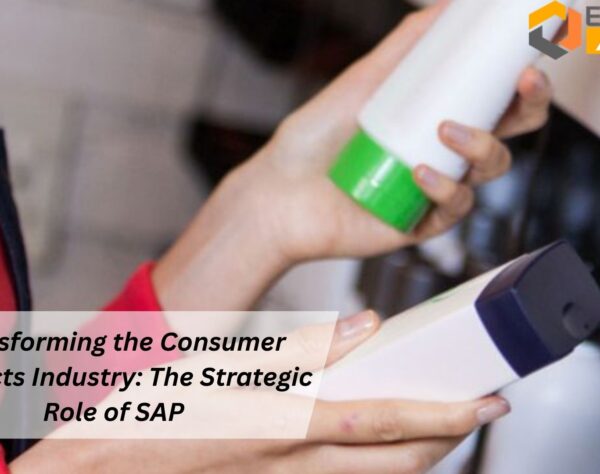
Ditch the Old Ways! Odoo is the Future of Consumer Products.

Odoo Unboxed: The Secret Weapon for Consumer Products Success
The consumer products industry is one of the most competitive and rapidly evolving markets in the world. From fast-changing customer preferences to rising production costs and supply chain disruptions, businesses in the consumer products sector face enormous challenges to stay competitive. Traditional business models, fragmented software solutions, and manual workflows are no longer sufficient to meet these demands.
Enter Odoo — a modern, flexible, and fully integrated business management platform that is revolutionizing how consumer products companies operate. Odoo offers a comprehensive suite of business applications covering sales, inventory, production, customer relationship management (CRM), e-commerce, and financials — all under one roof.
Unlike legacy systems that are rigid, expensive, and difficult to scale, Odoo is designed to be modular and adaptable. Businesses can select the specific applications they need and seamlessly scale as they grow. This makes Odoo the perfect solution for consumer products businesses looking to automate operations, reduce costs, improve customer experiences, and unlock new growth opportunities.
In this blog, we’ll explore why Odoo is the future of the consumer products industry and how it addresses the most pressing challenges faced by businesses today.
The Changing Landscape of the Consumer Products Industry
The consumer products industry is more complex and fast-paced than ever before. With growing competition, evolving customer expectations, and increasing operational costs, businesses face several key challenges:
🚨 1. Supply Chain Volatility and Disruption
Global supply chains have become increasingly unstable due to political tensions, natural disasters, shipping delays, and fluctuating material costs. For consumer products businesses that rely on just-in-time manufacturing and global sourcing, even minor disruptions can cause significant production delays and increased costs.
🚨 2. E-Commerce Explosion and Multichannel Complexity
The rise of e-commerce and direct-to-consumer (DTC) models has transformed the way consumer products are sold. Businesses now have to manage sales across multiple channels — including online stores, third-party marketplaces, and physical retail locations — while ensuring consistent pricing, inventory levels, and customer service.
🚨 3. Rising Customer Expectations
Today’s customers expect fast delivery, real-time order tracking, personalized recommendations, and excellent customer service. A single bad experience can lead to lost business and negative reviews on social media, damaging brand reputation.
🚨 4. Data Silos and Lack of Real-Time Insights
Many businesses use separate systems for inventory management, sales, customer service, and production. This creates data silos, making it difficult to get a unified view of operations and make informed decisions based on real-time data.
🚨 5. Shrinking Profit Margins and Rising Costs
Raw material costs, labor expenses, and shipping fees continue to rise. Businesses need to find ways to optimize production, reduce waste, and improve operational efficiency to maintain profitability.
🚨 6. Regulatory and Compliance Challenges
Consumer products companies are subject to strict quality standards, environmental regulations, and product labeling requirements. Non-compliance can lead to fines, recalls, and damage to brand reputation.
How Odoo is Revolutionizing the Consumer Products Industry
Odoo addresses these challenges head-on with a fully integrated, customizable platform that allows consumer products companies to manage their entire business from a single interface. Its modular structure and open-source framework make it flexible, scalable, and highly adaptable to the specific needs of consumer products businesses.
1. Seamless Supply Chain Management
Managing complex supply chains requires real-time visibility and proactive decision-making. Odoo’s supply chain module provides complete control over every step of the process:
🔹 Supplier Management: Monitor supplier performance, delivery timelines, and material quality.
🔹 Automated Procurement: Automatically generate purchase orders based on inventory levels and production forecasts.
🔹 Multi-Warehouse Integration: Manage inventory across multiple locations and distribution centers in real-time.
🔹 Lead Time Optimization: Reduce production lead times by identifying and resolving bottlenecks in the supply chain.
🔹 Alternative Sourcing: If a supplier fails to deliver, Odoo can automatically switch to backup suppliers.
A leading consumer goods company using Odoo reduced supply chain disruptions by 30% and improved supplier performance tracking within six months.
2. Centralized Inventory Management
Inventory mismanagement leads to lost sales, increased holding costs, and frustrated customers. Odoo’s inventory module gives businesses real-time control over stock levels, movement, and valuation:
📦 Real-Time Tracking: Track stock levels, movement, and order status across warehouses and sales channels.
📦 Automated Stock Replenishment: Odoo automatically generates restocking orders based on real-time sales and production data.
📦 FIFO and LIFO Tracking: Improve inventory rotation and reduce spoilage or obsolescence.
📦 Multi-Channel Inventory Syncing: Keep inventory levels consistent across online stores, marketplaces, and physical locations.
📦 Returns and Refunds: Simplify returns and refunds with automated processing and tracking.
A consumer products business reduced inventory holding costs by 25% and increased order fulfillment rates by 18% using Odoo’s inventory management features.
3. Automated Sales and Order Management
Managing sales across multiple channels can be overwhelming. Odoo centralizes sales and order processing, allowing businesses to automate key processes and deliver a seamless customer experience:
✅ Order Automation: Automatically process online and offline orders from multiple channels.
✅ Upselling and Cross-Selling: Recommend related products and increase basket size using customer insights.
✅ Payment Processing: Integrate with multiple payment gateways and automate invoicing.
✅ Order Fulfillment: Automate picking, packing, and shipping to reduce order processing time.
A leading fashion brand increased sales by 20% within a year of switching to Odoo for order and customer management.
4. Personalized Customer Experience with Odoo CRM
Customer loyalty is essential in the consumer products industry. Odoo’s CRM module helps businesses deliver a more personalized customer experience:
👥 Customer Segmentation: Group customers based on buying behavior, demographics, and order history.
👥 Automated Follow-Ups: Send personalized offers and product recommendations.
👥 Customer Support: Manage complaints, returns, and inquiries through an integrated helpdesk.
👥 Customer Feedback: Collect and analyze customer feedback to improve products and services.
A consumer electronics company improved customer retention rates by 30% after using Odoo’s CRM module.
5. Efficient Manufacturing and Production Management
Odoo’s manufacturing module enables businesses to automate production planning and improve operational efficiency:
⚙️ Work Order Automation: Automatically generate work orders based on sales forecasts and inventory levels.
⚙️ Machine Utilization: Monitor machine performance and downtime to increase productivity.
⚙️ Bill of Materials (BOM): Define and automate production recipes.
⚙️ Waste Reduction: Track production waste and identify cost-saving opportunities.
6. Business Intelligence and Analytics
Odoo’s integrated business intelligence tools provide deep insights into business performance:
📊 Custom Dashboards: Monitor sales, inventory, and production data in real-time.
📊 Profitability Analysis: Identify high-margin products and adjust pricing strategies.
📊 Performance Tracking: Measure employee and machine productivity.
📊 Forecasting: Predict demand and adjust inventory and production plans accordingly.
FAQs
1. How does Odoo help consumer product companies improve sales performance?
Odoo automates sales tracking, customer segmentation, and personalized recommendations to increase sales.
2. Can Odoo integrate with third-party marketplaces?
Yes, Odoo integrates with platforms like Amazon, Shopify, and eBay for centralized order processing.
3. Does Odoo support multi-currency and multi-location management?
Yes, Odoo allows businesses to manage sales and inventory in multiple currencies and regions.
4. How does Odoo reduce production costs?
By automating scheduling, machine tracking, and inventory management, Odoo reduces waste and increases efficiency.
5. How secure is Odoo’s platform?
Odoo uses encrypted data transmission and multi-factor authentication for secure access.
6. Can Odoo handle returns and refunds?
Yes, Odoo automates the returns process and updates inventory in real-time.
7. How does Odoo improve customer satisfaction?
Faster order processing, personalized service, and better product recommendations increase customer satisfaction.
8. Does Odoo support sustainability tracking?
Yes, Odoo tracks energy consumption, waste, and carbon footprint for sustainability reporting.
9. Is Odoo suitable for small and large consumer product businesses?
Yes, Odoo’s modular structure makes it scalable for businesses of all sizes.
10. Can Odoo integrate with POS systems?
Yes, Odoo integrates with most POS systems for real-time sales tracking.
Odoo is not just a software — it’s a complete business transformation platform.







